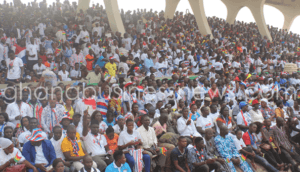Movement to campaign against inequality in Ghana takes shape
 A movement comprising civil society organisations and journalists to start advocacy, public education and campaigns to draw attention to rising inequality in Ghana and urge government action to address the situation is taking shape.
A movement comprising civil society organisations and journalists to start advocacy, public education and campaigns to draw attention to rising inequality in Ghana and urge government action to address the situation is taking shape.
The movement was put together after a two-day workshop on the subject of fiscal policies and inequality in some West African countries including Ghana.
The participants at the workshop, with the theme, “Fiscal policies to tackle inequality in Ghana” called on the Ghana government to take steps and deal with inequality in the society.
The workshop held under the auspices of the Institute of Democratic Governance (IDEG) was held in Accra on February 14 and 15, 2017.
The participants looked at a study commissioned by OXFAM-IBIS titled “Fiscal Policies to Tackle Inequality in Burkina Faso, Ghana and Sierra Leone,” and discussed issues relating to inequality in Ghana and explored solutions to those issues.
The study, among others found that progressive spending on social services can positively impact inequality, but government’s spending in education and health, for example, has decreased marginally over the last three years.
“Health spending decreased from 11 per cent in 2014 to 8 per cent in 2016 while spending in education decreased from 18 per cent in 2014 to 17 per cent in 2016. With regard to social protection, the government’s spending in recent years stands at 2.3 per cent below the AU Windhoek threshold of 4.5 per cent of GDP,” it said.
The study also found that indirect taxes are regressive in nature and tend to deepen inequality, noting that Ghana still collects 55 per cent of its tax revenues from indirect sources (eg VAT, excise duties and custom duties).
“Ghana spends more than half of its budget to service debts. In 2015 Ghana spent 61 per cent of its budget on debt servicing. This affects spending in pro-poor social services required to reduce inequality,” the report pointed out.
In a communiqué after the workshop, the participants indicated that they have drafted an advocacy action plan and constituted a National Inequality Movement to mobilize civil society to contribute to addressing inequality in Ghana.
The participants made the following recommendations to effectively deal with the issue of inequality in Ghana. They ask that health spending must be increased from 8 per cent to 15 per cent in line with the 2001 Abuja Declaration. While admitting that education spending is impressive compared to spending on health, they recommend to the government to strive to increase education spending beyond the current 17 per cent.
They indicate that education spending, however, must focus more on basic education than secondary and tertiary education since access to basic education has a positive effect on inequality.
“On social protection, government should increase spending from the current 2.3 per cent to the AU Windhoek threshold of 4.5 per cent of GDP, and increase revenue collection from direct taxes (for example corporate tax, personal income tax, taxes in the extractive industries).”
The participants also urged the government, to collaboration with CSOs and the media, to embark on rigorous tax education and called on the government to renegotiate the terms of the loans in order to free up funds for spending in social services.
By Emmanuel K. Dogbevi
